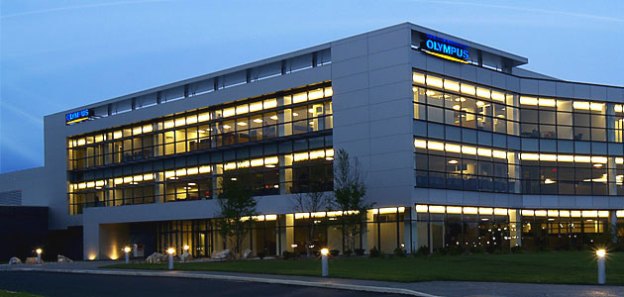
To most consumers, Olympus is a Japanese company that makes a selection of well-regarded digital cameras, including recent Micro Four Thirds interchangeable lens cameras like the PEN E-PM1. The company also dabbles in a handful of other useful gizmos like digital voice recorders. However, Olympus get started way back in 1919 making medical gear: Originally, it made thermometers and microscopes, and today makes a huge range of endoscopic gear, along with ultrasound units, sanitization and disinfectant equipment, plus a selection of industrial products: scanners, flaw detectors, gauges, videoscopes, analyzers, and more. Olympus may not be a huge name in the consumer arena, but it is a huge name in other markets.
However, for the last few weeks, Olympus has been surrounded by controversy and scandal. The company installed — then quickly sacked — it’s first non-Japanese CEO, then admitted that it paid out some $687 million to Axes America as an advising fee related to the Olympus’s $2.2 billion takeover of British medical gear maker Gyrus in 2008. That $687 million is roughly a third of the total price Olympus paid for Gyrus, proportionately making it the largest merger and acquisition fee ever paid. And Axes America? It’s shut down, along with the Cayman Islands company that handled the transaction.
Olympus’s stock price has dropped steeply, and now regulators and agencies in Japan, the United Kingdom, and the United States are looking deeply into the Gyrus transaction as well as other recent Olympus acquisitions, with ousted CEO Woodford is leading the charge. Could the exorbitant fees represent kickbacks? Bribes? Money laundering? Or just a wily financial advisor lining his nest? What the heck is going on?
Michael Woodford
Beginning in 2003, Olympus was lead by Tsuyoshi Kikukawa, but he’d been exerting influence withint the company for three decades. Kikukawa had been instrumental in getting Olympus into the digital camera business, although he also pursued an aggressive merger-and-acquisition strategy that sometimes rankled investors. Kikukawa oversaw more than 30 takeovers during his tenure, with deals totaling more than $4.3 billion. The strategy did lead to Olympus’s sales increasing by more than 80 percent, although its operating profit remained relatively flat and in his last year at the helm Olympus’s profit had dropped 85 percent year-on-year, pulled down by losses in the camera division.
On April 1, 2011, Olympus appointed Michael Woodford as the company’s president and chief executive officer, with Kikukawa shifting to chairman of the company’s board. Woodford was a 30-year Olympus veteran who had played a major role in Olympus’s European division, and fit in well with both Western and Japanese corporate culture. According to some, Woodford’s only major deficiency as a high-level executive for a Japanese company was that he didn’t play golf: Woodford was viewed as a solid, loyal choice for expanding Olympus’s business outside Japan, keeping the company’s core business intact, and improving the bottom line through the some of the cost-cutting strategies he had employed in Europe.
However, things didn’t work out that way. In his new role as CEO, Woodford began to look into advisory fees and writedowns that had impacted Olympus’ bottom line. Of particular interest were four takeovers that Olympus had conducted in the last three years, and one really stood out: the $2.2 billion takeover of Britain’s Gyrus Group plc, a maker of endoscopic gear and medical visualization equipment. As part of the deal, Olympus seemed to have paid $687 million to Axes America, with the bulk going to Axam Investments, a Cayman Islands company associated with Axes.
Woodford commissioned PriceWaterhouseCoopers to look into the Gyrus deal. The firm gave Woodford its report on October 11, saying that it had been unable to confirm there had been improper conduct at Olympus, but that the “cost of the transaction to Olympus is extremely significant and is as a result of a number of actions taken by management which are questionable and which give cause for concern.” The report noted potential offenses committed by Olympus management included breach of duty, false accounting, and financial assistance.
The same day, Woodford wrote to chairman Kikukawa: “It is truly extraordinary and frankly unbelievable that Olympus […] made a series of payments approaching USD $700 million in fees to a company in the Cayman Islands whose ultimate ownership is still unknown to us, preventing the auditors from verifying that no related parties were involved.”
That was probably the epitaph for Woodford’s career at Olympus. On October 14, Olympus removed Woodford from the president and CEO roles on a unanimous vote, while letting him stay on as a director on the company board. Officially, Olympus claimed Woodford’s “management direction and method” was disrupting Olympus’s operations and could no longer be tolerated
After his dismissal, Woodford released the PriceWaterhouseCoopers report to Bloomberg., along with letters he’d sent to Olympus’s board questioning the transactions.
The Gyrus deal
In 2008, Olympus announced a $2.2 billion deal to take over Gyrus. At the time, the company said only that independent investment bank Parella Weinberg had advised on the deal.
On October 19 of this year, Olympus acknowledged (PDF) paying $687 million to an unnamed financial adviser on the deal. According to Olympus, that figure included $5 million in basic renumeration in 2006 followed by a $12 million success fee in late 2007. That success fee would represent 5 percent of the Gyrus deal, putting it right in line with typical arrangements with merger and acquisition advisors. However, almost a year later, in September 2008, Olympus paid the (still unnamed) advisor nearly $229 million to acquire Gyrus warrants and options. Olympus says that was payment was Gyrus preferred stock requested by the advisor in expectation of capital participation in the deal: In other words, Axes America not only advised on the deal, but acquired stock in Gyrus that it later sold back to Olympus so Olympus would have complete ownership of the company. And, in March 2010, Olympus did it again, paying over $443 million more to the same unnamed advisor to acquire the rest of its preferred Gyrus stock. Olympus attributes the size of the payment to increases in the value of the advisor’s holdings.
The $687 million represents a completion fee that’s more than 30 percent of the price Olympus paid for Gyrus. It is completely normal for corporations to hire outside advisers to look for acquisition targets and pay them varying amounts based on the value of any completed transaction. However, those fees typically represent 1 to (on the far outside) 10 percent of the value of the entire transaction. A completion fee of over 30 percent is simply astounding.
The unnamed advisor was Axes America, run out of New York City, along with Axam Investments, a related offshore company in the Cayman Islands.
Woodford’s PriceWaterhouseCoopers report on the Gyrus deal wasn’t the first red flag. Two years ago, as the Olympus acquisition was going down, KPMG resigned as auditor of Gyrus, citing the company’s relationship with Axam Investments. According to media reports, the relationship with Axam’s grant of $176 million in shares would enable the company to reap 85 percent of Gyrus’s future profits. After KPMG quit, Gyrus hired Ernst & Young as auditors, who appear to have reported similar concerns.
Axes America
Olympus says its relationship with the unnamed advisor — Axes America — ended with the $443 million stock buyback. Olympus says it has no knowledge of the advisor’s current status.
So far, neither does anyone else. Within weeks of Olympus concluding its deal to acquire Gyrus, Axes America closed its doors. Once Olympus made its final $443 million payment to the Cayman Islands, Axam Investments disappeared too: It shut down and was removed from the local business registry in June 2010 because it didn’t bother to renew its license.
Axes America and Axam Investments were operated by Japanese banker Hajime Sagawa, now a resident of Boca Raton, Florida, and got started in 2000. Axes America never generated major revenue, but similarly had never raised flags with regulators or the financial industry. SEC filings (2007, 2008, 2009, all PDFs) from Axes America indicate the company served as a middle-man for Olympus’s relationship with Parella Weinberg, Olympus’s named advisor on the Gyrus deal. Axes America claimed to have paid Parella Weinberg about $8.5 million of the original $12 million in “basic renumeration” and “completion fees” acknowledged by Olympus; in 2009, it mentions $24 million in option and warrant rights assigned to an “off-shore related entity” — that would likely be Axam Investments. Although Sagawa was almost certainly involved, Cayman Island financials regulations do not require disclosure of ownership of Axam Investments. As such, Axam Investments’ true owners remain unknown.
Prior to forming Axes America, Sagawa worked as Sanyo Securities America’s head of mergers and acquisitions, and previously seems to have been employed at Nomura Securities and Drexel Burnham Lambert in the 1980s. Sagawa should be in his mid-60s by now; the shutdown of Axes America and Axam Investments may represent his retirement.
Sagawa has not commented on the Olympus matter and so far has not been reached by the media. He has not been accused of any wrongdoing.
Altis, NewChef, and Humalabo
Since being sacked as CEO, Michael Woodford has returned to the United Kingdom, and asked the UK’s Serious Fraud Office to investigate the Gyrus deal since at least portions of the transactions with Parella Weinberg took place in the UK, and other payments were apparently handled by Olympus’s UK unit. (The Cayman Islands are a British Overseas Territory.) Woodford turned over the PriceWaterhouseCoopers report as well as documents he collected from Olympus in Japan to assist in the investigation.
Overall, Woodford is questioning some $1.5 billion worth of transactions conducted by Olympus. That includes not just the $687 million paid to Axes/Axam, but also acquisitions of medical waste recycler Altis and two companies completely unrelated to Olympus’s core businesses: NewChef, a maker of microwavable cookware, and Humalabo which makes — yes — face cream. Olympus wrote off three quarters of their investments on those three companies within a year of concluding the deals.
Axes America and Hajime Sagawa appear to have had no involvement in those three transactions; instead, they seem to have been spearheaded by brothers Akinobu and Nobumasa Yokoo, the latter of whom is an ex-Nomura banker. Nobumasa’s resigned from Nomura in June 1998 following a scandal involving payoffs extorted by Japanese sōkaiya (corporate racketeer) Koiki Ryuichi. Some Nomura executives were eventually arrested for their roles. Shortly thereafter, Nobumasa Yokoo convinced Olympus to make a ¥30 billion investment in a venture capital fund.
Woodford has implied he is seeking police protection while he urges authorities to investigate the transactions, and in an interview yesterday apparently indicated there were possibly “forces behind” Olympus’s board of directors who exerted influence on the transactions.
This week, Woodford travelled to the United States to meet with FBI agents and federal prosecutors. According to the New York Times, the FBI opened a case two weeks ago, and the Securities and Exchange Commission is re-examining Axes America.
Meanwhile, back at Olympus…
Last week, Olympus announced it would form a third-party committee to examine the company’s recent acquisitions, but gave no timetable for when the committee would report results or how its investigation would be conducted.
Tsuyoshi Kikukawa resigned yesterday as Olympus’s chairman, responding to pressure from the investment community and hoping to quiet the persistent scandal now surrounding the company. Olympus stock surged some 23 percent in trading, staving off some of the losses the company has endured as a result of the scandal. Shuichi Takayama has taken over as president and CEO.
The company held a news conference with Takayama and executive VP Hisashi Mori in Tokyo on Thursday. At the conference, Mori indicated he had been introduced to Axes America — and presumably Hajime Sagawa — by an individual in Japan. Mori declined to name the individual. Mori indicated Axes America had assisted Olympus in an informal capacity without compensation beginning in 2004, and was formally hired on as an advisor in 2006. Takayma defended the payments to Axes and Axam.
Olympus says it has not been contacted by the FBI.


